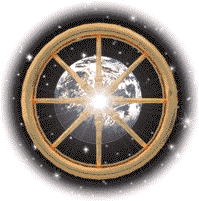for the Southern Hemisphere

The Wheel of the Year
for the Southern Hemisphere

I began this section just before Lughnasadh,
1999, and I will be gradually adding each Sabbat.
Wicca is a religion tied closely to the Wheel of the Year, the changing seasons and phases
of life: birth, growth, death and rebirth. The eight Sabbats each reflect an aspect of the
cycle of life, and here I have tried to include not only a brief explanation of each
Sabbat, but some snippets from writings by others such as poems, stories, chants,
blessings, invocations and so on, that reflect some of the diversity of Wiccan rituals.
If you want to see some of the rituals I have written for the Wheel of the Year, visit my Sabbat Rituals page in my Book of Shadows and Lights.
Find the Sabbat
| Imbolc (Candlemas, Oimelc, Imbolg) | Spring Equinox (Alban Eilir) | Beltaine (Roodmass, Cyntefyn) | Summer Solstice (Litha, Alban Hefin) |
| Lughnasadh (Bron Trogain, Lammas) | Autumn Equinox (Alban Elfed, Mabon) | Samhein (Calan Gaeaf) | Yule (Winter Solstice, Alban Arthan) |
Lughnasadh
Summer's End - February 1st or 2nd (Northern Hemisphere is July 31st)
Other names and spellings for Lughnasadh: Lughnassad, Lammas, Bron Trogain
Lughnasadh (pronounced loo-nus-ah) means "the commemoration of Lugh". And that
is exactly what we do at this time of the year. His name may be from the Latin root word lux,
meaning light (which also gives us Lucifer, 'the light-bringer'). In Irish legend, Lugh
was the leader of the Tuatha De Danann, the people of the Goddess Dana and the
last-but-one conqueror of Ireland in the Irish myth cycles. In battle Lugh blinded the
leader of the opposing forces, the Fomors. Lugh is also a god who undergoes death and
rebirth in a sacrificial mating with the Goddess, as in the legend of his Welsh
counterpart, Llew Llaw Gyffes in the Mabinogion.
In the festival of Lughnasadh, we see the victory of the younger God over the elder God,
the victory of Lugh over Balor: Lugh takes the fruits of the elder's power from him. One
of the themes of Lughnasadh ritual is the sacrificial mating of the God with the Goddess
and his rebirth. This can be symbolised in many ways and one common way in my working
group is to prepare a loaf of bread, shaped as a man to represent the God, and chop his
head off during the ritual. The head will be kept as an offering to the Goddess and the
body of the God consumed - from the body of the God, comes the food for life. In the
symbolic death of the Corn God/the Sun God, the Holly King is reborn.
In simpler terms, what are we celebrating at Lughnasadh? This is the time of year for the
first harvests. Summer is coming to an end - Autumn and Winter are approaching. We
celebrate the first fruits of harvest and say farewell to the Sun God as he is sacrificed
by the Goddess to ensure plentiful crops for next year. The blood of the Sun God/Corn God
feeds the land and ensures fertility. Here is a section from a Lughnasadh Ritual written
by Jan Brodie which invokes the Goddess and the God:
| Priestess: Goddess of the Grain, Harvest Mother. Join with us on this the Feast of Lugh. The corn stands ripe in the fields. We give thanks for the fruitful earth. Now is the time for the reaping of the Corn King. We sorrow for his dying Yet we rejoice in his coming again. Priest: I call upon the Corn King To be with us this night. We honour his virility, We worship his fertility. We sorrow in his dying Yet we rejoice in his coming again. |
In The Witches of Oz, as part of the ritual, each person comes forward with a
gift for the earth, and says:
| Thank you for the good things you have given to me. Thank you for the food in my belly, the water which gives me life, the fire which gives me warmth and light, the air which I breathe, and the Earth which is my home. I give you in return a small gift; a symbol of my love for all the things which you have given to me. |
Here's a good article by
Katrina at the Witches Voice site which is really nice because she gives her personal
perspective.
Home Page ......... Site Map .......... WiccaWeb
.......... Book of Shadows and Lights
Background by Neithti
Wheel graphic is copyright Robin Wood
This page is Copyright Lilitu Babalon, 1999
I'll give you permission to reproduce anything on my page if you ask, provided it is mine.
However, if I find you plagiarising, well.....